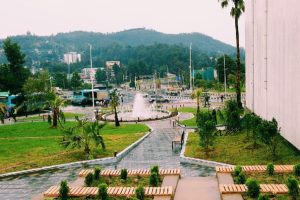
BY TEWODROS KASSA
Different tourism experts underscored that Addis will be one of the five Africa’s preferable tourist destinations in the near future. The capital has immense tangible and intangible cultural heritages that lend the city its glamour of being home to diversified and colorful Africans.
It was at the final decade of the 19th century Addis came into being. Since its establishment, the city, being cultural, traditional, social, political and economic center for its diverse residents, has passed through enormous occurrences. Plenty of tangible and intangible cultural heritages have been remarkable in the city.
The tangible heritages are those that could be physically touched such as costumes, great monuments such as temples, public monuments, and historical buildings as well as different art galleries. Meanwhile the intangible heritages exist intellectually in culture.
The intangible heritages could not be physically touched. But we can hear them from other persons or read from different sources. Intangible heritages include modern and cultural songs, myths, beliefs, superstitions; oral poetries as well as other messages that were transmitted through the means of oral and aura and inherited from the past.
Addis Ababa has paramount attraction with its precious and diverse natural gifts, the day to day cultural activities of its dwellers as well as its historical tract and the process of the establishment of the city and its long history which makes it unique.
Empress Taitu, wife of Emperor Menilek II, was a huge figure that takes the credit for the coming into being of Addis Ababa in 1886. The Empress coined the name Addis Ababa to the city. Its meaning in English means “New Flower”. The city was initially located where hot springs abounded. This virtue was complemented by a very good climate.
Addis Ababa is enlarging both horizontally and vertically. Its dwellers usually call the city with a pet name “Addis” or “Sheger”. Side by side with its day to day development and its ever growing attractiveness, the popularity of the city is mounting. The city is becoming a nerve center for political and socio-economical institutions and it is a diplomatic hub of the continent and the global community as many international organizations have a seat in the city. Addis Ababa has immense tourism potentials as it is headquarters of the African Union (AU) and the United Nations Economic Commission for Africa (UNECA).
More over various cultural, art, fashion, political, economic and plenty of international as well as continental conferences and events are repeatedly being organized and hosted in the city. The high level securities, political stability, economical and infrastructural progresses that are now being registered across the nation are attributable to the preferential treatment the city is enjoying. Due to all these, many are wondering its attractions and the city is getting more attention; and is now admired by tourists from abroad. Ethiopians are well known for their hospitality.
A melting pot of a diverse array of ethnic groups, Addis could be taken as a model of Ethiopia (a miniature of Ethiopia). The marvelous traditions, cultures, holidays, togetherness, comfy climatic endowment, unique, diversified, peaceful and beautiful nation, nationalities and peoples elevate the city as well as the country in general to be the most preferred tourist destination.
The economic growth and infrastructural developments are highly showing a sustainable progress in all sectors and in all places and cities of the country including Addis Ababa. Adding jewels to its crown the city has also adopted a new coordinated simple light rail transportation service over the past few years.
The city is abundant with places appealing to visitors. Some of the notable places in the city include among others the biggest open market called Merkato. The Meskel Festival (The festive which is registered by UNESCO as one of the intangible world heritages) is one of the colorful events.
The Meskel religious festive, who is celebrated by the Ethiopian Orthodox Church, takes place every year at the Meskel Square, the place in which hundreds of thousands gather annually for commemorating the founding of the true cross.
And the other one is the Entoto Mountain which is located at the northern corner of Addis in a position that affords a panoramic view to the city. The other significant religious festival that attracts many to Addis is Timket (the Ethiopian Epiphany) that commemorates the Baptism of Jesus by the Ethiopian Orthodox Church.
If one comes to the city for any reason, she/he should not lose the opportunity of visiting the whole ancestor of mankind and humanity named Lucy. You will get a chance to observe the female fossilized skeleton of Lucy at the National Museum. Ethiopians call Lucy Dinkinesh which means “You are marvelous”.
In sum, the tourism experts recommended that the tourism sector has ample opportunities to galvanize the participation of stakeholders and utilize it in promoting the economic growth of the nation.
More importantly, the tourist serving sectors would work effectively to provide hospitable services and urged restaurants, hotels, tour owners and stakeholders to build their capacity and carry out their responsibility effectively and efficiently.
THE ETHIOPIAN HERALD FRIDAY 12 AUGUST 2022





